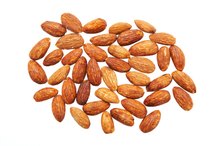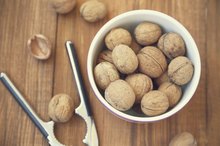What does fact checked mean?
At Healthfully, we strive to deliver objective content that is accurate and up-to-date. Our team periodically reviews articles in order to ensure content quality. The sources cited below consist of evidence from peer-reviewed journals, prominent medical organizations, academic associations, and government data.
The information contained on this site is for informational purposes only, and should not be used as a substitute for the advice of a professional health care provider. Please check with the appropriate physician regarding health questions and concerns. Although we strive to deliver accurate and up-to-date information, no guarantee to that effect is made.
Sunflower Seeds & B-6 Toxicity
Sunflower seeds are a popular snack among spectators at competitive sporting events, passengers on long car rides or people engaging in any activity that allows mindless chomping. The seeds are commonly sold in the hull, which has a uniquely almond shape and striped coloring.
Nutrition Facts Overview
The term "sunflower seed" is used to describe what is technically considered to be a kernel inside the hull. The hull is not normally eaten and can be split in two parts inside the mouth and spit out, leaving behind the seed kernel. In this article, the nutritional information represents only the sunflower seed kernel.
Vitamin B6 Benefits
How Much EPA & DHA Are in Chia Seeds?
Learn More
Vitamin B6 is essential to the human body, supporting multiple physiological pathways. For example, vitamin B6 helps build red blood cells, which transport oxygen around the body. Sunflower seeds are a good source of vitamin B6. One ounce of sunflower seeds contains 0.228 mg of vitamin B6, which represents 10 percent of the U.S. Department of Agriculture Recommended Daily Allowance for this vitamin 2. The RDA for vitamin B6 is 1.3 mg for both men and women ages 19 to 50 years.
- Vitamin B6 is essential to the human body, supporting multiple physiological pathways.
- One ounce of sunflower seeds contains 0.228 mg of vitamin B6, which represents 10 percent of the U.S. Department of Agriculture Recommended Daily Allowance for this vitamin 2.
Vitamin B6 Toxicity
The National Institutes of Health Institute of Medicine reports that vitamin B6 doses of 500 mg a day can result in nerve damage to the arms and legs. This neuropathy is usually related to high intake of vitamin B6 from supplements and is reversible when supplementation is stopped. The Institute of Medicine has established an upper tolerable intake level (UL) for vitamin B6 of 100 mg per day for all adults.
Risk for Vitamin B6 Toxicity
Hulled vs. Unhulled Sesame Seeds
Learn More
While it may seem plausible to eat 1 lb. of sunflower seeds during a big game or a long drive, even 1 lb. of sunflower seeds contains a level of vitamin B6 nowhere close to the upper tolerable intake level. Given 0.22 mg of vitamin B6 per ounce of sunflower seed kernels, you would need to eat 454 oz. of sunflower seeds, or 28.4 lb 3.
- While it may seem plausible to eat 1 lb.
- Given 0.22 mg of vitamin B6 per ounce of sunflower seed kernels, you would need to eat 454 oz.
Nutritional Facts
Sunflower seed kernels are naturally high in calories and fat, and low in sodium. They may be prepared with or without oil and salt, which will change their nutritional profile. Sunflower seeds contain phytosterols, which are suggested to have a cholesterol-lowering effect 3. The U.S. Department of Agriculture Nutrient Data Laboratory reports that 1 oz 2. of toasted sunflower seed kernels (no salt) contains 175 calories; 16 g of fat; 5 g of protein; 16 mg of calcium; 2 mg of iron; 37 mg of magnesium; 328 mg of phosphorous; 139 mg of potassium; and 1.5 mg of zinc.
Dietary Considerations
Sunflower seeds are sold raw, roasted, salted or in-shell. Like any salted nut, sunflower seeds with added salt can be high in sodium and are not recommended for people following a low-sodium diet. Roasted sunflower seeds have added oils and can be high in fat. The nutritional benefits of sunflower seeds are duplicated in sunflower oil, sunflower butter and bread products. Sunflower seeds are a common ingredient in trail mix and nut breads.
- Sunflower seeds are sold raw, roasted, salted or in-shell.
- Sunflower seeds are a common ingredient in trail mix and nut breads.
Related Articles
References
- Dietary Supplement Fact Sheet: Vitamin B6
- U.S. Department of Agriculture: Nutrient Data Laboratory
- Science Daily: Sunflower Seeds, Pistachios Among Top Nuts For Lowering Cholesterol
- Seeds, sunflower seed kernels, toasted, without salt. FoodData Central. U.S. Department of Agriculture. Published April 1, 2019.
- Defeat Diabetes Foundation. Nuts and Seeds: Energy and Nutrient-Dense Foods.
- Kaczmarczyk MM, Miller MJ, Freund GG. The health benefits of dietary fiber: Beyond the usual suspects of type 2 diabetes mellitus, cardiovascular disease and colon cancer. Metabolism. 2012;61(8):1058-1066. doi:10.1016/j.metabol.2012.01.017
- Yang J, Wang HP, Zhou L, Xu CF. Effect of dietary fiber on constipation: A meta analysis. World J Gastroenterol. 2012;18(48):7378-7383. doi:10.3748/wjg.v18.i48.7378
- Anderson J, Baird P, Davis RH, et al. Health benefits of dietary fiber. Nutrition Reviews. 2009;67(4)188-205. doi:10.1111/j.1753-4887.2009.00189.x
- Lattimer JM, Haub MD. Effects of dietary fiber and its components on metabolic health. Nutrients. 2010;2(12):1266-1289. doi:10.3390/nu2121266
- Kunzmann AT, Coleman HG, Huang WY, Kitahara CM, Cantwell MM, Berndt SI. Dietary fiber intake and risk of colorectal cancer and incident and recurrent adenoma in the prostate, lung, colorectal, and ovarian cancer screening trial. Am J Clin Nutr. 2015;102(4):881–890. doi:10.3945/ajcn.115.113282
- Vitamin E. National Institutes of Health Office of Dietary Supplements. Updated February 28, 2020
- Antioxidants: In Depth. National Institutes of Health, National Center for Complementary and Integrative Health. Updated November 2013
- American Academy of Allergy Asthma & Immunology. Cross Reactivity of Seed Allergens.
- Manatakis DK, Acheimastos V, Antonopoulou MI, Balalis D, Korkolis DP. Gastrointestinal seed bezoars: A systematic review of case reports and case series. Cureus. 2019;11(5):e4686. Published 2019 May 17. doi:10.7759/cureus.4686
- Manne JR, Rangu VM, Motapothula UM, Hall MC. A crunching colon: Rectal bezoar caused by pumpkin seed consumption. Clin Med Res. 2012;10(2):75-7. doi:10.3121/cmr.2011.1016
- Seeds, sunflower seed kernels, dry roasted, with salt added. USDA FoodData Central. April 1, 2014.
- National Sunflower Association. Frequently asked questions.
Writer Bio
Janelle Commins started writing professionally in 2007. She has written for the "UCLA Total Wellness" magazine on nutrition and fitness topics that are of interest to young adults. Her work has also appeared in various online publications. She holds a Bachelor of Science in nutrition science from University of California, Davis, and a Master of Science in public health from University of California, Los Angeles.









